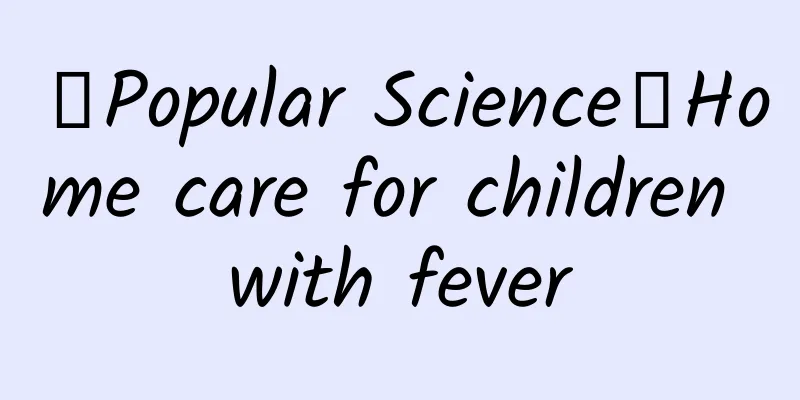【Popular Science】Home care for children with fever

|
Children are particularly prone to fever due to their weak physical condition and immunity. Many parents think that fever is no big deal and should not be taken seriously. However, in reality, the adverse effects and harms of fever on children should not be underestimated. As a parent, understanding and mastering the correct home care methods are essential to relieve children's symptoms, prevent complications and promote recovery. The hazards of fever in children: ① Fever can cause a large amount of water loss in children. If timely and effective treatment is not paid attention to, it may cause water and electrolyte disorders in children. Therefore, parents must pay attention to helping children take in enough water during fever. ② Long-term and repeated high fever can cause certain damage to the brain of young children, leading to abnormal brain function and adverse effects on their healthy growth and development. Therefore, parents must prevent the occurrence of repeated high fever in children in time to avoid unnecessary damage to their children's brains. ③ Fever can greatly affect the appetite of young children, leading to symptoms such as loss of appetite, nausea and vomiting. The appearance of these symptoms will prevent children from fully consuming the various nutrients needed by the body. ④ Continuous fever will also pose a certain threat to children's lung health and cause pneumonia of varying degrees. ⑤ The occurrence of fever may also cause the harm of febrile convulsions in young children, causing sudden loss of consciousness, body convulsions, and inverted eyeballs. The potential harm to children cannot be ignored. Home care methods for children with fever: ① Observe symptoms: When a child has a fever, the first thing to do is to closely observe their symptoms. Pay attention to changes in the child's body temperature and whether there are any other symptoms, such as coughing, runny nose, vomiting, diarrhea, etc. These symptoms can help you determine the cause and severity of the child's illness and take appropriate care measures. ② Maintain a suitable ambient temperature: Maintaining a suitable indoor temperature is crucial to relieving children's fever symptoms. The indoor temperature should not be too high or too low, and it is generally more suitable to keep it between 22-24 degrees Celsius. Pay attention to indoor ventilation, open windows for ventilation, and keep the air fresh. (Note: Remove the room temperature here) Children can also be placed in an air-conditioned room or blown by an electric fan to gradually lower their body temperature. If the child's limbs are cold and shivering, they should be covered with a blanket and bathed with hot water; if the hands and feet are warm and the whole body is sweating, you can take off too much clothing, but avoid getting cold. ③ Replenish water: When a child has a fever, their body will sweat more, which can easily lead to dehydration. Therefore, children should be encouraged to drink more water to replenish body fluids. For children who are reluctant to drink water, alternative products such as juice and oral rehydration salts can be provided. However, excessive drinking of water should be avoided to avoid increasing the burden on the child's kidneys. ④ Effective oral and skin care. During high fever, saliva secretion decreases and the oral mucosa becomes dry. At this time, food residues in the mouth are easy to ferment, which is conducive to bacterial growth and may cause glossitis, gingivitis, etc. In order to clean the mouth in time, it is best to rinse the mouth with salt water after each meal. During high fever and fever reduction, a lot of sweat will be produced. Attention should be paid to skin care, sweat should be wiped off in time, clothes should be changed, and the skin can be wiped with a warm towel to keep the skin clean and dry. ⑤ Physical cooling: When a child has a fever, physical cooling methods can be used to relieve symptoms. For example, gently wiping the child's forehead, neck, armpits and other parts with a wet towel can help lower body temperature. In addition, children can also wear light and breathable clothes to avoid excessive wrapping that causes body temperature to rise. ⑥ Drug antipyretic: If necessary, antipyretic drugs can be given to children under the guidance of a doctor. Common antipyretic drugs include acetaminophen and ibuprofen. When using medications, you must strictly follow the instructions or the doctor's advice to avoid overdose or overuse of medications. ⑦ See a doctor promptly: If the child's fever symptoms persist or are accompanied by severe symptoms such as high fever convulsions and difficulty breathing, you should seek medical attention promptly. During the medical process, it is important to describe the child's symptoms, temperature changes, and home care in detail to the doctor so that they can better develop a treatment plan for the child. Mastering the correct home care methods is of great significance to relieve children's fever symptoms, prevent complications, and promote recovery. As parents, it is important to closely monitor changes in children's symptoms, take appropriate care measures, and seek medical treatment in time when necessary. At the same time, it is necessary to maintain a positive attitude, provide adequate care and support for children, and promote their early recovery. Author: Wu Weiwei and Song Yuling The Seventh People's Hospital of Dingzhou City, Hebei Province |
<<: [Nursing Science] Do you really understand nebulization inhalation in children?
>>: Do you know the daily care precautions for ovarian cancer patients?
Recommend
National Ear Care Day丨How many behaviors are likely to cause hearing loss?
Today is March 3rd, National Ear Care Day Accordi...
Eat more fruits and vegetables during menopause
Once menopause comes, both men and women will fee...
Will there be a lot of bleeding in a spontaneous abortion?
There may be other symptoms of spontaneous aborti...
How to accurately determine the ovulation day?
Ovulation is a very important physiological pheno...
It only takes a few minutes a day to lower blood pressure and reduce the risk of heart disease!
Taking 5 minutes a day to exercise may sound insi...
What is the reason for the severe backache?
In daily life, especially female friends often ha...
Is traditional Chinese medicine good for treating salpingitis?
Salpingitis is a disease that women suffer from. ...
Menstrual period color is pink
Adult women all have a monthly menstrual period. ...
Can I use heat to treat breast hyperplasia?
Breast hyperplasia is a relatively common breast ...
Symptoms of liver and gallbladder dampness and heat in women
When women are diagnosed with liver and gallbladd...
The impact of not having menstruation after a month of abortion
In modern society, the phenomenon of cohabitation...
Abdominal pain after egg retrieval
The abdomen will hurt after egg retrieval. This i...
Risk factors and early preventive measures for coronary heart disease
Dear elderly friends, let’s talk today about coro...
A new tool for tracking cells will provide more clues for early cancer diagnosis and treatment
In the microscopic world of life, each cell also ...
What should women eat to nourish the kidneys?
Kidney deficiency not only occurs in men, but man...









